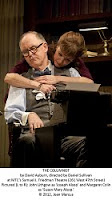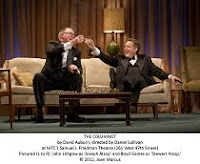 |
| Dawn Jamieson, Dylan Carusona, Nancy McDoniel, Tyree Giroux, Tanis Parenteau, and Michelle Honaker in "Miss Lead" at 59E59 Theaters. Photo by Steve Bartel |
As EPA standards lessen, land and water, as in the headlines about West Virginia, is polluted by companies safely unaccountable for their misdeeds. Going back to recent history, in the 1940's, the Bureau of Indian Affairs was able to use WWII as an excuse to allow mining for lead on Native grounds. In that case, as in the current headline events, the government is complicit.
Mary Kathryn Nagle's "Miss Lead," at 59E59 Theaters, in an Amerinda production, through January 26th, looks at a combination of the historic mismanagement by the BIA and the fact that large companies have been allowed to ride roughshod over communities, particularly Native American ones, around the country. Unfortunately, all the sympathy for those vicimized cannot make sense of the jumbled plot. |
| Tanis Parenteau in "Miss Lead" at 59E59 Theaters. Photo by Steve Bartel |
The device of using a writer, Katie (Tanis Parenteau), as the central character and sometime narrator only serves to distance the viewer from the tragedy at the heart of the story. "Miss Lead" is an unconvincing drama.
Kudos to Elizabeth Rolston, who as Rebecca, has to deliver a polemic with fluidity and ease. Among the large cast, Stuart Luth, both as Fred and as David, and Claire Louise Burke as Ruth are the most natural.
Also in a dual role, as Glenda and Aunt Mallory, Nacy McDoniel gives some broadly comic relief.
For more information about "Miss Lead," please visit 59E59 Theaters.


































